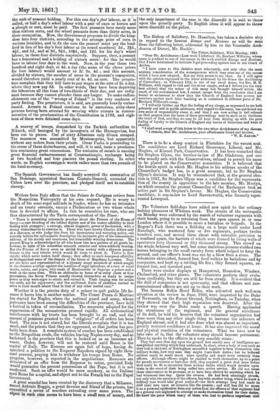Writers from Italy affirm that the Prince de Carignan retires
from the Neapolitan Viceroyalty at his own request. He is weary to death of his semi-regal solitude in Naples, where he has no intimates and no trusty servants, except a Piedmontese or two whose whole time is devoted to affairs. In this he resembles his race, who are thus characterized by the Turin correspondent of the Times: " There is something extremely peculiar about the Princes of the House of Savoy—a rare blending of the loftiest dignity and of the easiest affability in their dealing with strangers ; a strange, almost magnetic, power of fascination, with a strong disinclination to exercise it. Those who have known Charles Albert only at a distance, or who judge him from his inconsistent and wavering policy, can scarcely believe the enthusiastic description his intimates give of his consummate address, of his stately and courteous, but irresistibly winning demeanour. The present King is acknowledged by all who know him as a pattern of all gentle be- haviour, in spite of his somewhat uncouth exterior and ultra-soldierly bearing. But the Princes of Savoy seem to shrink from society. with a shyness propor- tionate to the very talents which would fit them to adorn it. Theirs is that royalty which never makes itself cheap; they affect no such bourgeois affability as distinguished some of the despots of the house of Hapsburg Lorraine. They are the heirs and representatives of a dynasty many members of which sought in the cloisters a refuge against the inanities of regal splendour, of a race of royal monks, saints, and popes, who made of Hautecombe or Superga a palace and a tomb at the same time. With an abdication to boast of at every three or four generations, the Savoy Princes usually showed themselves as ready to resign power as they were eager to attain and extend it. Their longing was for action and strife, not for enjoyment; and the sublimest fruits of ambition turned to ashes in their mouth sooner than in that of any other mortal race."
Whether it is the precise duty of a prince to quit public life be- cause it bores him is another matter. The Count Ponza di Martino has started for Naples, where the national guard and army, whose jealousies have been among the difficulties of the province, have held a festival in token of reconciliation. The measures adopted for the suppression of the monasteries proceed rapidly. All ecclesiastical interference with lay trusts has been brought to an end, and the amount of pensions granted to the " religious ' of all orders has been fixed. The sum is not stated, but the liberals complain that it is too much, and the priests that they are oppressed, so that justice has pro- bably been done. A. complete system of coaches has been established on the Neapolitan roads, the vehicles leaving Naples every day, and so backward is the province that this is looked on as an immense ad- vance. Order, however, will not be restored until Rome is the capital of Italy. The Romans are again full of hope, having de. spatched a petition to the Emperor Napoleon signal by eight thou- sand persons, praying him to withdraw his troops from Rome. No progress, however, is reported in the negotiations. Rumours are circulated of an offer from the Emperor to retire, provided Italy would guarantee the present possessions of the Pope, but it is not confirmed. Such an offer would be mere mockery, as the Italians need Rome for a capital, and object not to the French but to the Papal Government.
A great scandal has been created by the discovery that a Milanese, named Antonio Boggia, a great devotee and friend of the priests, has committed a series of murders extending over some years. The object in each case seems to have been a small sum of money, and the only importance of the case is the discredit it is said to throw upon the priestly party. To English ideas it will appear to throw more discredit on the police.






























 Previous page
Previous page